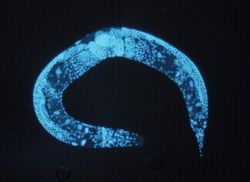RNA interference
 The Nobel Prize in Physiology or Medicine 2006 was awarded jointly to silencing by double-stranded RNA".
The Nobel Prize in Physiology or Medicine 2006 was awarded jointly to silencing by double-stranded RNA".
Andrew Fire and Craig Mello studied regulation of gene expression in the nematode Caenorhabditis elegans. They found that injecting mRNA which coded for a muscle protein did not change the worms' behaviour. Injecting complementary 'antisense' RNA, which could pair with the original 'sense' RNA also had no effect, but when the 'sense' and 'antisense' double RNA strand were injected together, the worms' behaviour changed. They displayed twitching movements, similar to those noted in worms without the gene for the muscle protein.
In 1998 they published their method of degrading mRNA from a particular gene. Their technique, RNA interference (RNAi), used double-stranded RNA molecules - sense and antisense pairs of RNA. These activated biochemical mechanisms in a cell that destroyed mRNA with the same code. When the mRNA was destroyed, the particuar gene it related to was 'silenced'.
RNAi occurs naturally in plants and animals, regulating gene expression, and helping to control viruses. This process is now used as a scientific method to silence genes in adult worms in order to study their function.
Further reading
http://www.nobelprize.org/nobel_prizes/medicine/laureates/2006/popular-medicineprize2006.pdf
http://www.nytimes.com/2006/10/03/science/03nobel.html?_r=0
http://genetics.thetech.org/original_news/news34
Last edited: 27 August 2014 05:58
